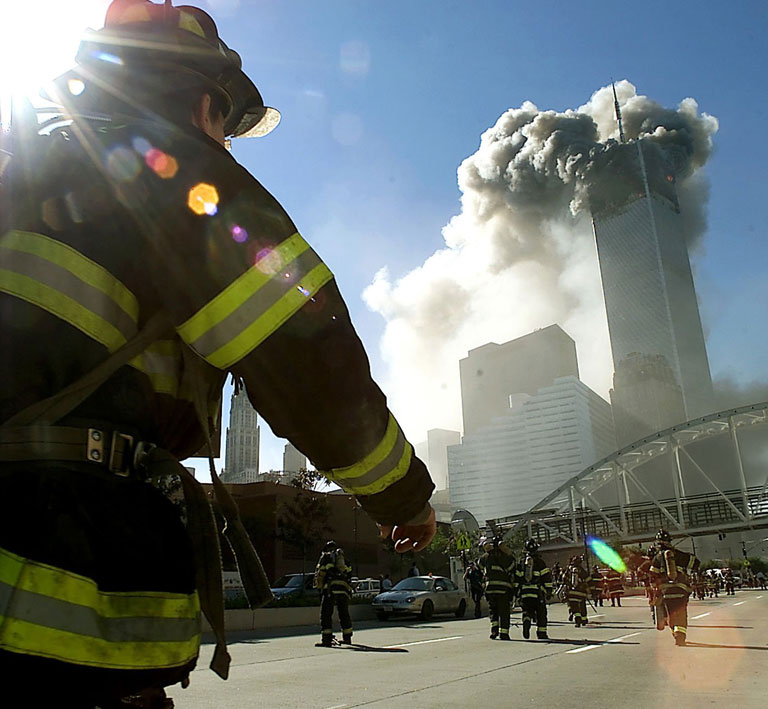
By Andrew Card and Leon Panetta
This column originally appeared in The San Francisco Chronicle on September 11, 2025.
On Sept. 11, 2001, America was forever changed. In the heartbreak, the heroism and the unwavering resilience that followed the terrorist attacks of that day, the country made a promise to “Never Forget.”
That vow became the foundation of our collective response to the tragedy. But as time marches on, we must confront an uncomfortable truth: We are forgetting.
Today, more than 100 million Americans are too young to remember the attacks. And many of the surviving victims and heroes of 9/11, who we would look to for teaching them about that day, are no longer with us. The need for education, remembrance and unity has never been more critical.
Sadly, patriotism looks different, too, as deep divisions threaten the sense of unity that defined the aftermath of 9/11. Our collective memory of that day is beginning to fade.
A 2017 audit revealed that only 26 states include 9/11 in their high school curricula, and only nine address the long-term impacts of the global war on terror. A 2022 poll found that many young adults — who have no memory of the attacks — cannot explain what “Never Forget” means.
Their disconnect was amplified in 2022 when TikTok videos sympathizing with Osama bin Laden’s “Letter to America” that spread dangerous ideologies amassed more than 14 million views. A 2023 poll that showed nearly 1 in 5 Americans age 18-29 held a “positive view” of bin Laden underscores that growing detachment.
The lessons of 9/11 — lessons about unity, resilience and vigilance — are being subsumed by the passage of time. The brutal attack was a wakeup call to the dangers of terrorism. This nation came together to bind the wounds of thousands of families that had lost loved ones, recognized that we were at war with those responsible for 9/11, and that we owed ourselves and future generations the promise that such an attack must never happen again. Today, more than ever, we must not forget the lessons of unity, resilience and vigilance.
These realities — and the need to ensure that the events of that day and their far-reaching consequences are never lost to history — are the motivation for the formation of the 9/11 Legacy Foundation.
While the National September 11 Memorial & Museum in New York does an exceptional job each year in paying tribute to the victims of 9/11, next year’s 25th anniversary will deserve something even greater. It should be a nationwide remembrance uniting all of America in reflection, action and commitment to the future.
Much like the America 250 project — the organizing committee for America’s 250th birthday — the 9/11 Legacy Foundation, where we serve on the organizing committee, strives to elevate the significance of this milestone. We owe it to those who died and their families, to all of those who fought and died protecting our country from terrorism, to those who bravely carried out the raid that brought bin Laden to justice — to never forget the sacrifices that were made.
The attacks on 9/11 serve as a stark reminder of the constant threat that looms over our nation. This country must acknowledge the cost of inaction and the dangers posed by those who continue to threaten our democracy. And we must remain ever vigilant and always ready to defend the freedoms and values that define us as Americans.
We take action to ensure the memory of that day is not just preserved but actively shared with future generations. We must translate “Never Forget” into “We Remember,” a tangible call to action that extends beyond words into much more than a once-a-year observance.
It’s essential that the legacy of 9/11 lives on in every American heart.
Andrew Card and Leon Panetta serve on the organizing committee of the 9/11 Legacy Foundation. Card was secretary of transportation under President George H.W. Bush and was White House chief of staff under President George W. Bush. Panetta, who was a U.S. representative from Monterey, was director of the Office of Management and Budget, White House chief of staff under President Bill Clinton, director of the Central Intelligence Agency and secretary of defense.





